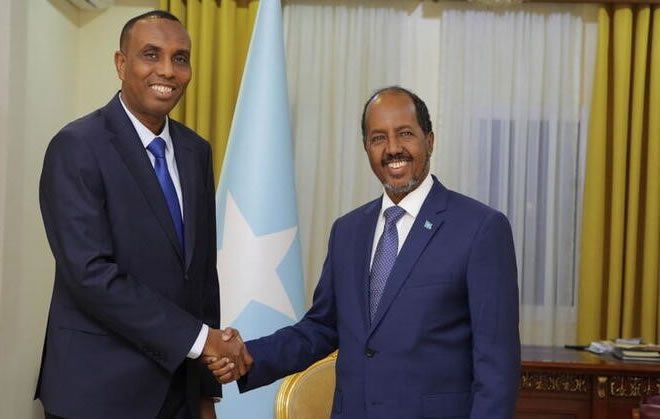MOGADISHU (KAAB TV) – Somalia finds itself once again on the precipice of a political fragmentation as tensions escalate between President Hassan Sheikh Mohamud’s administration and the regional states, following Villa Somalia’s unilateral decision to change the constitution and abolish the prime minister’s position.
The move has raised concerns about the potential disintegration of federal institutions.
Just two days after the Somali National Consultative Council (NCC) granted itself sweeping powers to alter the constitutional order, the Puntland Political Forum issued a strong statement denouncing the unconstitutional decision.
The Forum expressed its apprehension, warning that such a hasty move could lead to dictatorship and further destruction, while disregarding the constitution and consensus-based decision-making procedures.
Highlighting the significance of abiding by the draft constitution and political agreements, the Forum emphasized the need for a united Somalia and the importance of rebuilding transitional and post-transition institutions.
“The Puntland Political Forum considers the National Consultative Council (NCC) statement dated May 27, 2023 to be dangerous, and believes it may lead to dictatorship and further destruction. This decision is hasty, and violates the constitution and decision-making procedures whereby political agreement is reached by consensus” reads the statement.
They called on the bicameral legislature not to endorse any political agreement that lacks broad consensus. It further urged politicians, academics, traditional elders, and the Somali people to work together toward a peaceful and inclusive Somalia, addressing constitutional flaws at both federal and regional levels, while maintaining good governance and national unity.
Meanwhile, President Said Abdullahi Deni of Puntland, a key federal member state, expressed his determination to pursue an independent path if President Hassan Sheikh Mohamud continued to disregard key provisions of the constitution. Deni emphasized that Puntland would remain independent until a unified Somalia adhering to constitutional rule is achieved.
Adding to the already tense situation, politicians and clan elders from Baidoa and Mogadishu threatened to establish their own self-rule due to perceived marginalization by President Hassan Sheikh’s government. They cited concerns over the misappropriation of state resources, rampant corruption, and the unequal distribution of foreign aid to the government.
Opposition leaders, including a former president and three prime ministers, condemned the move as unconstitutional and urged those involved to reconsider actions that could plunge the country further into chaos.
As Somalia faces this constitutional crisis, the nation stands at a critical juncture, with the need for political consensus and inclusive dialogue becoming more crucial than ever.
“The stakes are high, and the decisions made in the coming days or months will shape the future trajectory of Somalia’s governance and stability,” says political analyst Mohamed Nuur.
Transitioning away from the existing clan-based power-sharing system, which mandates equal representation for the four major clans and half for the remaining clans, poses a significant challenge. Complicating matters, Somalia’s constitution has remained provisional since its adoption in 2011, without undergoing a referendum.
According to experts, any substantial constitutional amendments necessitate consensus through an inclusive process. Given the country’s current state of division into rival regional states and the evident deep-seated distrust among clans, it is essential that all clans have a voice in the process.


